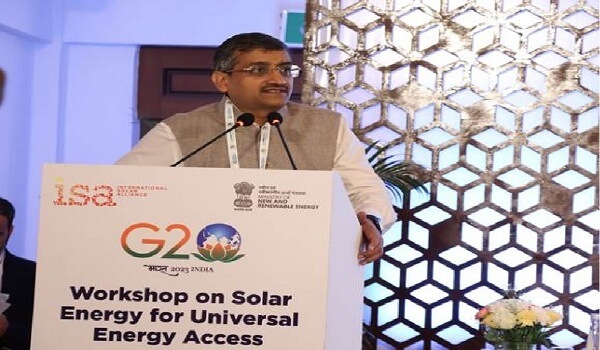Ministry of New and Renewable Energy (MNRE), in partnership with the International Solar Alliance, unveiled the report on ‘Roadmap of Solar Energy for Universal Energy Access’ developed under India’s G20 presidency in 2023 showcases how solar energy can play a key role in achieving electricity access and providing socio-economic benefits globally.The roadmap is unveiled during the 4th G20 Energy Transition Working Group held in Goa. It focuses on achieving Universal Energy Access by 2030 and highlighted the crucial role of solar mini grids in driving sustainable energy solutions.
Key Highlights of the Report
- The roadmap emphasizes solar energy as a key solution to achieve Universal Energy Access by 2030.
- It identifies around 59% (396 million people) of the unelectrified population best suited for electrification through solar-based mini-grids.
- Approximately 30% of the unelectrified population (203 million people) can be electrified through grid extensions, and the remaining 11% of the unelectrified population (77 million people) through Decentralized Renewable Energy solutions.
- A total investment of around USD 192 billion is required to accomplish the electrification goals, distributed among solar-based mini-grids, solar-based decentralized renewable energy solutions, and grid extensions.
- Viability gap funding of around 50% (USD 48.5 billion) is needed to support mini-grid deployment.
- The roadmap underscores the importance of addressing challenges related to policies, regulations, and financial risks for successful and sustainable scaling up of solar energy solutions.
- It highlights the need for technical and financial expertise, skill development, and awareness creation in energy access-deficit regions to drive electrification initiatives.
- The report advocates for increased investments, ecosystem development, and optimal resource utilization to accelerate universal energy access.
- Integration of solar PV-based cooking solutions with electrification initiatives is emphasized as a way to enhance energy access in remote and underdeveloped areas.
Solar Mini-grids
- Solar mini-grids are small-scale electricity generation and distribution systems that use solar photovoltaic (PV) technology to generate electricity and store it in batteries.
- They are typically designed to provide electricity to communities or areas that either need to be connected to the main power grid or experience frequent power outages.
- Around 9% of the global population still lacks access to electricity, with Sub-Saharan Africa and rural areas being the most affected.
- Solar mini-grids can play a crucial role in addressing this challenge by providing reliable and affordable electricity to these communities.
- Moreover, over 1.9 billion people worldwide lack access to clean cooking, and solar mini-grids can also power electric stoves or other cooking appliances, providing clean cooking solutions.

